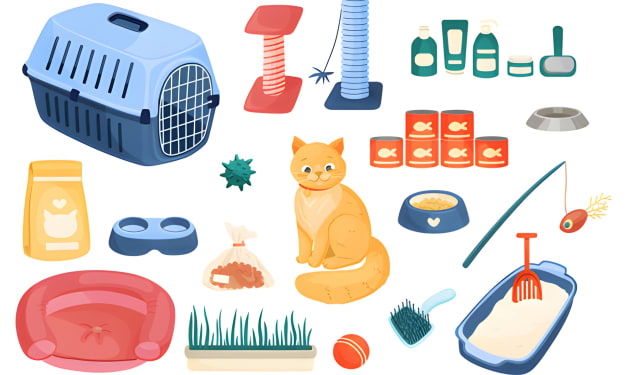
Tips for Calming and Socializing Skittish or Angry Bunnies
Rabbits can make wonderful pets, but they also have unique personalities and behaviors that require patience and understanding from their owners. One of the most challenging situations is dealing with a frightened or aggressive rabbit. Whether your bunny is new to your home or has always been skittish, there are steps you can take to help them feel safe and secure. In this guide, we'll cover the best methods for calming and socializing a frightened or aggressive rabbit.
First, it's important to understand that fear and aggression in rabbits is often a defense mechanism. Rabbits are prey animals in the wild, so they are naturally wary of potential threats. Loud noises, sudden movements, and unfamiliar people and environments can all trigger a fearful response. Aggression is usually a way for a rabbit to protect themselves or their territory.
If your rabbit is showing signs of fear or aggression, such as freezing in place, thumping their hind legs, growling, or lunging, it's crucial to approach them calmly and slowly. Avoid direct eye contact, which can be seen as a challenge, and let the rabbit sniff your hand before petting them. Offer treats to build positive associations with your presence.
It's also important to provide your rabbit with a safe, comfortable environment. Make sure their enclosure is large enough for them to move around freely and has plenty of hiding spots. Line the bottom with soft bedding and include toys and chew items to keep them entertained. Avoid placing the enclosure in high-traffic areas or near loud noises.
When interacting with your rabbit, always move slowly and speak softly. Avoid picking them up unless absolutely necessary, as this can be stressful for them. Instead, sit on the floor near their enclosure and let them approach you on their own terms. Offer treats from your hand and gently stroke their head and cheeks, which they often enjoy.
It's also important to establish a routine with your rabbit. Feeding, playtime, and cleaning should happen at the same time each day. This helps them feel more secure and less anxious.
If your rabbit continues to be fearful or aggressive despite your efforts, it may be helpful to consult with a veterinarian or animal behaviorist. They can rule out any underlying medical issues and provide additional guidance on socializing your bunny.
In the meantime, be patient and consistent in your approach. Rabbits can take time to warm up to new people and environments. With love, care, and understanding, even the most frightened or aggressive rabbit can learn to trust and enjoy their human companions.
Calming a Frightened Rabbit
One of the most important things to remember when dealing with a frightened rabbit is to never punish or yell at them. This will only increase their fear and make them less likely to trust you. Instead, use positive reinforcement to build their confidence.
When approaching a frightened rabbit, move slowly and avoid direct eye contact. Offer them a treat, such as a piece of carrot or apple, from your hand. If they seem interested, slowly extend your hand towards them, palm down, and let them sniff it. If they seem comfortable, you can gently stroke their head or cheeks.
It's also important to provide your rabbit with a safe, comfortable environment. Make sure their enclosure is large enough for them to move around freely and has plenty of hiding spots. Line the bottom with soft bedding and include toys and chew items to keep them entertained. Avoid placing the enclosure in high-traffic areas or near loud noises.
When interacting with your rabbit, always move slowly and speak softly. Avoid picking them up unless absolutely necessary, as this can be stressful for them. Instead, sit on the floor near their enclosure and let them approach you on their own terms. Offer treats from your hand and gently stroke their head and cheeks, which they often enjoy.
It's also important to establish a routine with your rabbit. Feeding, playtime, and cleaning should happen at the same time each day. This helps them feel more secure and less anxious.
If your rabbit continues to be fearful despite your efforts, it may be helpful to consult with a veterinarian or animal behaviorist. They can rule out any underlying medical issues and provide additional guidance on socializing your bunny.
Socializing an Aggressive Rabbit
Aggressive behavior in rabbits can be more challenging to deal with than fear, but it's still possible to socialize them with patience and consistency. It's important to understand that aggression is often a defense mechanism, and it's crucial to address the underlying cause.
If your rabbit is showing signs of aggression, such as growling, lunging, or biting, it's important to avoid punishing them. This will only make them more fearful and less likely to trust you. Instead, use positive reinforcement to build their confidence.
When approaching an aggressive rabbit, move slowly and avoid direct eye contact. Offer them a treat, such as a piece of carrot or apple, from your hand. If they seem interested, slowly extend your hand towards them, palm down, and let them sniff it. If they seem comfortable, you can gently stroke their head or cheeks.
It's also important to provide your rabbit with a safe, comfortable environment. Make sure their enclosure is large enough for them to move around freely and has plenty of hiding spots. Line the bottom with soft bedding and include toys and chew items to keep them entertained. Avoid placing the enclosure in high-traffic areas or near loud noises.
When interacting with your rabbit, always move slowly and speak softly. Avoid picking them up unless absolutely necessary, as this can be stressful for them. Instead, sit on the floor near their enclosure and let them approach you on their own terms. Offer treats from your hand and gently stroke their head and cheeks, which they often enjoy.
It's also important to establish a routine with your rabbit. Feeding, playtime, and cleaning should happen at the same time each day. This helps them feel more secure and less anxious.
If your rabbit continues to be aggressive despite your efforts, it may be helpful to consult with a veterinarian or animal behaviorist. They can rule out any underlying medical issues and provide additional guidance on socializing your bunny.
Spaying and Neutering
One of the most effective ways to reduce aggressive behavior in rabbits is to have them spayed or neutered. Hormonal changes can cause rabbits to become more territorial and aggressive, especially during mating season. Spaying or neutering can help reduce these behaviors and make your rabbit more affectionate and easier to handle.
It's important to note that spaying and neutering should be done by an experienced veterinarian who is familiar with rabbits. Rabbits are delicate animals and anesthesia can be risky, so it's crucial to choose a vet who has extensive experience with rabbit surgery.
After your rabbit has been spayed or neutered, it's important to give them time to recover before attempting to handle them. Once they have healed, you can begin the process of socializing them using the techniques described above. With patience and consistency, even the most aggressive rabbit can learn to trust and enjoy their human companions.
Conclusion
Dealing with a frightened or aggressive rabbit can be challenging, but with patience, consistency, and the right approach, it's possible to help them feel safe and secure. Remember to always move slowly, speak softly, and use positive reinforcement to build their confidence. Provide them with a safe, comfortable environment and establish a routine to help them feel more secure. If your rabbit continues to be fearful or aggressive despite your efforts, don't hesitate to consult with a veterinarian or animal behaviorist for additional guidance. With love and understanding, even the most skittish or angry bunny can learn to trust and enjoy their human companions.
About the Creator
Hasan
Welcome...
In this site of mine you can learn amazing things and many information that you don't know so please subscribe to my site.
Enjoyed the story? Support the Creator.
Subscribe for free to receive all their stories in your feed. You could also pledge your support or give them a one-off tip, letting them know you appreciate their work.






Comments
There are no comments for this story
Be the first to respond and start the conversation.